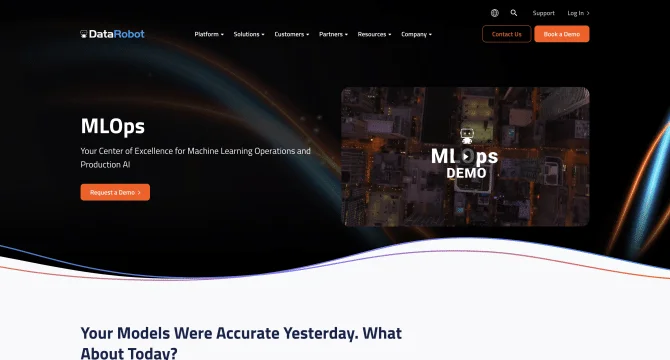Introduction
DataRobot is a comprehensive platform designed to meet the generative and predictive AI needs of businesses. It offers a suite of tools that cover the entire lifecycle of machine learning, from data preparation to model deployment and monitoring. The platform's user-friendly interface and robust backend make it accessible to both data scientists and business analysts, enabling them to leverage the power of AI without deep technical expertise. With DataRobot, users can automate the mundane tasks of data cleaning, feature engineering, and model training, allowing them to focus on higher-level analytical work. The platform also supports integration with existing systems and workflows, ensuring seamless deployment of AI models into production environments.
background
DataRobot, Inc., founded in 2012, is a leading provider of automated machine learning solutions. With a team of experts from renowned institutions such as MIT and Harvard, DataRobot has been at the forefront of AI and machine learning innovation. The company's products, DataRobot Platform and DataRobot Studio, cater to enterprise-level needs with a focus on security, scalability, and ease of use. DataRobot's commitment to democratizing data science has been recognized by industry analysts, earning it a spot among the top AI and ML platforms.
Features of DataRobot
Data Preparation
DataRobot automates the process of data cleaning, transformation, and integration, ensuring high-quality and consistent input for machine learning models.
Feature Engineering
The platform performs automatic feature selection, construction, and transformation to enhance model performance.
Model Training
DataRobot selects the most suitable algorithms, tunes parameters, and assesses model performance autonomously.
Model Deployment
Provides functionalities for deploying models into real-world applications, with ongoing monitoring and updating for sustained efficiency and accuracy.
Automation
Reduces manual intervention and potential errors in the machine learning workflow.
Ease of Use
Enables users without extensive machine learning knowledge to build and deploy models with ease.
Efficiency
Delivers high-performance models quickly through automated algorithm selection and optimization.
Scalability
Supports large-scale data processing and model training to accommodate various business needs.
How to use DataRobot?
To use DataRobot, start by importing your data. The platform will guide you through data preprocessing, feature selection, and algorithm selection. DataRobot then automatically trains and evaluates the model, providing recommendations for optimization. Once satisfied with the model's performance, deploy it to your desired environment and monitor its accuracy and performance over time.
Innovative Features of DataRobot
DataRobot's innovation lies in its ability to automate the entire machine learning process, making it accessible to a broader audience and significantly reducing the time to insight. Its integration capabilities and scalable architecture also set it apart in the enterprise AI space.
FAQ about DataRobot
- What is the pricing model for DataRobot?
- DataRobot offers a free trial, after which customers pay based on actual usage, similar to utility billing.
- How do I get started with DataRobot?
- You can start with a free trial, and the platform provides extensive documentation and customer support to help you get started.
- Can I integrate DataRobot with my existing systems?
- Yes, DataRobot supports integration with various data sources and systems, allowing seamless deployment of AI models.
- What kind of support does DataRobot offer?
- DataRobot provides customer support via email and has a comprehensive FAQ section, tutorials, and case studies on their website.
- How does DataRobot ensure the accuracy of its models?
- DataRobot includes monitoring and measuring tools that track model performance over time, allowing for continuous optimization.
- What if I need help with a specific use case?
- DataRobot's community forum and customer service are available to assist with specific use cases and challenges.
Usage Scenarios of DataRobot
Predictive Analytics
Use DataRobot for forecasting customer behavior, product demand, and risk prediction.
Operational Optimization
Leverage the platform to optimize processes such as pricing strategies, marketing campaigns, and supply chain logistics.
Automated Processes
Implement automation in customer service, production lines, and financial processes using DataRobot's AI models.
Academic Research
Utilize DataRobot for complex data analysis and model building in academic and research settings.
Market Analysis
Employ the platform for analyzing market trends, consumer insights, and competitive intelligence.
User Feedback
Users appreciate DataRobot's ability to automate complex machine learning tasks, making the process more accessible and efficient.
DataRobot has been praised for its high-performance models and the platform's ability to handle large datasets with ease.
Feedback highlights the platform's intuitive interface, which simplifies the machine learning process for users of all skill levels.
Users have reported positive experiences with DataRobot's customer support, noting the responsiveness and helpfulness of the team.
others
DataRobot stands out in the AI industry for its commitment to innovation and user-centric design. The platform's robust feature set and scalable architecture cater to a wide range of business needs, from startups to enterprises.
Useful Links
Below are the product-related links, I hope they are helpful to you.
